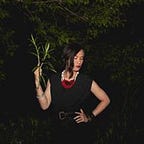What I Wanted to Wear: Getting Real, Getting Free
The day I decided that I had the right to use the word “woman” in reference to myself was the day I wore a dress and was harassed in public for the first time. Before that, I had always considered myself an extremely feminine gay man, occasionally genderqueer, or maybe a closet cross-dresser.
Privately, I longed for access to the words that I felt would grant me the magic, the courage, to finally become the person I dreamed about being: trans woman. The phrase belonged, it seemed to me, to a sisterhood of distant others, women stronger and worthier and prettier than I could ever be. I walked away from that first transphobic encounter on the street in my seven-dollar dress with my head held high — now, I too had suffered and survived this rite of passage. I was a real trans woman.
Looking into my wardrobe these days, I am reconsidering what I mean when I use the words real and trans and woman. Social justice culture and theory rely upon the concepts of privilege and oppression to define who we are, to slot us into identity categories: If I suffer misogyny, then I am a woman. If I suffer transphobia, then I am transgender.
Is suffering oppression all that makes me a trans woman? That and a closet full of pretty dresses?
As a writer and performer, I have created much of my professional reputation making art and speaking about the suffering of trans women of colour. What I politically represent, as a racialized and transgender body, means as much to my success — my livelihood — as the quality of my work itself.
So I take care to present my body in the “right” way when I am performing in a theatre, doing workshops at a university, presenting a keynote speech. I strap a padded bra over my small, blossoming breasts. I shave and pluck my body hair, apply makeup. I wear delicate vintage dresses.
I do it partly because I genuinely love feeling pretty, but also because I know that my feminine presentation makes me more interesting, easier to understand, more likely to be recognized as a woman by the people who buy and consume art and activism. Ironically, it is my femme appearance, and the experiences of violence that come with it, that give me value and “street cred” in liberal and leftist circles — the femme-ier, the better. In the eyes of many, my dresses make my struggle real.
The other month, I bought a gorgeous yellow dress from my favourite vintage shop in Montreal. It’s the exact shade of Belle’s ball gown in Beauty and the Beast, and made of a velvety floral-pattern fabric. It is the princessiest thing I own, and that’s after I removed the flouncy tulle under the skirt and the gigantic bow from the bodice.
I was intending to wear this dress at the launch of my new poetry chapbook. The chapbook is full of fiery revolution poems, all about gendered violence and racism and radical self-love.
Now I’m wondering, would my poems be less beautiful, my words less meaningful, if I performed them in jeans, a tanktop, and an oversize blue hoodie? Would people drop fewer coins into the pay-what-you-can jar if the only thing recognizably feminine about my body were my tiny, unpadded breasts?
Would I still be a trans woman, still be revolutionary, if I didn’t try to look pretty?
Maybe my womanhood shouldn’t be something I have to prove, or to earn, or to buy and sell (unless I want to). Maybe deep inside me, there is still a place where my feminity is sacred, something that is real because I believe in it.
When I think about the first woman I ever admired, I picture my mother. She’s a hard-working Chinese lady who grew up poor and doesn’t have time to spend hours thinking about identity or putting on makeup, because she is too busy supporting her family and being a superwoman doctor. She wears T-shirts from the 80s and cotton sweatpants every day. Sometimes I wonder: how did my experience of womanhood evolve so very differently from hers?
I don’t wonder for too long, though. I have work to do, clients to meet, pitches to email, poems to write. I am just a little Asian trans girl in a big world, and I have to hustle to get by — if that means wearing a dress and makeup to read my poems, then I’ll do it with a lipsticked smile.
Maybe I’m realer than I think.
Feeling deep ambivalence about how we dress is something the trans and gender non-conforming communities experience acutely, but it’s not just about us. We’d love to hear from everybody about how we navigate self presentation each day.
To see more What I Wanted to Wear posts, click on the tag below. When you’re ready to add your own post, tag it WIWTW when you hit Publish.
If you’re not near a computer, download Medium’s iOS app or Android app to write your What I Wanted To Wear post on your phone.
